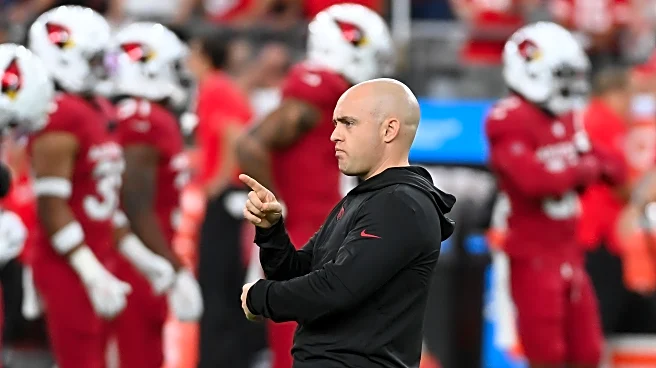What's Happening?
Cleveland Browns head coach Kevin Stefanski confirmed that rookie quarterback Shedeur Sanders is not receiving first-team practice reps, as the team focuses on developing Dillon Gabriel. Gabriel, who has taken over as the starting quarterback, is being
prioritized for practice reps to ensure his readiness for upcoming games. Stefanski explained that the approach differs from when veteran Joe Flacco was the starter, as Gabriel requires more practice time to develop his skills. Gabriel has shown promise with a 60% completion rate and three touchdowns in his appearances this season.
Why It's Important?
The decision to focus on Dillon Gabriel over Shedeur Sanders is significant for the Browns' strategy and player development. By prioritizing Gabriel, the team aims to build a strong foundation for its offensive lineup and improve its performance in the league. This move could impact Sanders' development and future opportunities within the team. The Browns' approach reflects a broader trend in the NFL where teams are investing in young talent to secure long-term success. Stakeholders, including fans and analysts, are watching how this decision will influence the team's performance and Gabriel's growth as a quarterback.
What's Next?
As the Browns continue to develop Dillon Gabriel, the team will likely assess his performance in upcoming games to determine his long-term role. The focus on Gabriel suggests that the Browns are committed to nurturing young talent, which could lead to changes in their overall strategy. Fans and analysts will be observing Gabriel's progress and its impact on the team's success. The Browns may also explore additional training or support for Sanders to ensure his development is not hindered.
Beyond the Headlines
The Browns' decision to focus on Dillon Gabriel highlights the importance of strategic player development in professional sports. This approach underscores the challenges teams face in balancing immediate performance needs with long-term growth. The situation also raises questions about the role of rookie players and the support they receive in high-pressure environments. The Browns' strategy may influence other teams in the league to adopt similar approaches in nurturing young talent.














